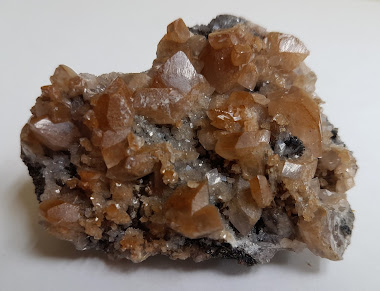Zinc Carbonate Market Analysis, Size, Share, Current Scenario and Future Prospects 2022-2028
Zinc carbonate is a chemical compound with the formula ZnCO3. It is a white, crystalline solid that occurs naturally as the mineral smithsonite. Zinc carbonate is insoluble in water, but soluble in acids. Zinc carbonate has a wide range of applications, including as a feed additive for animals, a component in pharmaceuticals and cosmetics, a corrosion inhibitor, a pigment in paints and coatings, and a source of zinc in fertilizers. It is also used in the production of other zinc compounds, such as zinc oxide and zinc chloride.
Zinc carbonate can be prepared by reacting a soluble zinc salt with a soluble carbonate salt, such as sodium carbonate or ammonium carbonate. It can also be obtained by the reaction of carbon dioxide with zinc hydroxide.
The global market for zinc carbonate is driven by various factors, including the increasing demand from industries such as animal feed, pharmaceuticals, and cosmetics. The rising demand for corrosion inhibitors and pigments in the paints and coatings industry is also driving the market growth.
In terms of geographical regions, Asia-Pacific is the largest market for zinc carbonate, owing to the increasing demand from end-use industries such as paints and coatings, rubber, and plastics. North America and Europe are also significant markets for zinc carbonate due to the presence of established industries and high demand for the compound.
Key players operating in the global zinc carbonate market include M-I Swaco a Schlumberger company, Global Chemical Co., Chengdu XiYa Chemical Technology Co., Ltd., Alfa Aesar, Bruggemann Chemical, LLC, Spectrum China Ltd., Yanggu Zhongtian Zinc Industrial Co., Ltd., Ltd., VWR International, and HBCChem, Inc.
The global zinc carbonate market is expected to grow at a moderate pace during the forecast period from 2021 to 2028. The market growth is driven by various factors, including the increasing demand from end-use industries such as animal feed, pharmaceuticals, and cosmetics.
The use of zinc carbonate as a corrosion inhibitor and pigment in the paints and coatings industry is also expected to contribute to the market growth. Additionally, the increasing demand for zinc carbonate as a source of zinc in fertilizers is expected to drive market growth.
Furthermore, the growth of the construction industry and increasing investments in infrastructure development projects in emerging economies are expected to create significant opportunities for the market players. The rising demand for zinc carbonate as a flame retardant in various applications, such as electronic devices, is also expected to drive market growth.
In terms of geography, the Asia-Pacific region is expected to witness significant growth in the zinc carbonate market during the forecast period. The growth is attributed to the increasing demand from various end-use industries, including paints and coatings, rubber, and plastics, and the presence of established players in the region.
The demand for zinc carbonate is driven by its versatile properties and diverse applications across various end-use industries.
One of the major drivers of the zinc carbonate market demand is the increasing demand from the animal feed industry. Zinc carbonate is widely used as a feed additive for animals, particularly for poultry and swine, as it improves their growth and overall health. The increasing demand for meat and dairy products is expected to further drive the demand for zinc carbonate in the animal feed industry.
The pharmaceutical industry is another major consumer of zinc carbonate. Zinc carbonate is used as a component in various pharmaceutical formulations due to its antibacterial, antifungal, and anti-inflammatory properties. The increasing prevalence of chronic diseases and the growing awareness of the importance of preventive healthcare are expected to drive the demand for zinc carbonate in the pharmaceutical industry.
Zinc carbonate is also used in the cosmetics industry as a skin protectant, astringent, and absorbent. The increasing demand for personal care products and cosmetics is expected to drive the demand for zinc carbonate in this industry.
In addition, the use of zinc carbonate as a corrosion inhibitor in the paints and coatings industry and as a source of zinc in fertilizers is also expected to contribute to the demand for zinc carbonate.
Zinc carbonate has a wide range of applications across various industries, including:
Animal Feed: Zinc carbonate is widely used as a feed additive in the animal feed industry, particularly for poultry and swine, as it improves their growth and overall health.
Pharmaceuticals: Zinc carbonate is used as a component in various pharmaceutical formulations due to its antibacterial, antifungal, and anti-inflammatory properties.
Cosmetics: Zinc carbonate is used in the cosmetics industry as a skin protectant, astringent, and absorbent.
Paints and Coatings: Zinc carbonate is used as a corrosion inhibitor in the paints and coatings industry.
Fertilizers: Zinc carbonate is used as a source of zinc in fertilizers to improve plant growth.
Rubber: Zinc carbonate is used as a reinforcing agent in rubber products, such as tires.
Plastics: Zinc carbonate is used as a filler in plastics to improve their mechanical properties.
Electronics: Zinc carbonate is used as a flame retardant in electronic devices to improve their safety.
The zinc carbonate market offers several benefits to various industries and end-use applications, including:
Animal Feed: Zinc carbonate is an essential nutrient for animal growth and development. Its addition to animal feed improves the health and growth of poultry and swine, resulting in increased productivity and better quality meat.
Pharmaceuticals: Zinc carbonate is used as a component in various pharmaceutical formulations due to its antibacterial, antifungal, and anti-inflammatory properties. It is also used in the treatment of skin conditions such as acne and eczema.
Cosmetics: Zinc carbonate is used in cosmetics as a skin protectant, astringent, and absorbent. It helps to improve the texture and appearance of the skin by absorbing excess oil and preventing bacterial growth.
Paints and Coatings: Zinc carbonate is used as a corrosion inhibitor in the paints and coatings industry. It helps to protect metal surfaces from rust and corrosion, extending their lifespan.
Fertilizers: Zinc carbonate is used as a source of zinc in fertilizers to improve plant growth. Zinc is an essential micronutrient for plant growth, and its addition to fertilizers improves crop yields and quality.
Rubber: Zinc carbonate is used as a reinforcing agent in rubber products, such as tires. It helps to improve the mechanical properties of rubber, such as its strength and durability.
Plastics: Zinc carbonate is used as a filler in plastics to improve their mechanical properties. It helps to reduce the cost of plastic production while maintaining the quality and durability of the final product.
Electronics: Zinc carbonate is used as a flame retardant in electronic devices to improve their safety. It helps to prevent fires and explosions in electronic devices, protecting both the device and the user.
Overall, the use of zinc carbonate offers several benefits to various industries and applications, making it a valuable compound in the global market.



.png)
Comments
Post a Comment